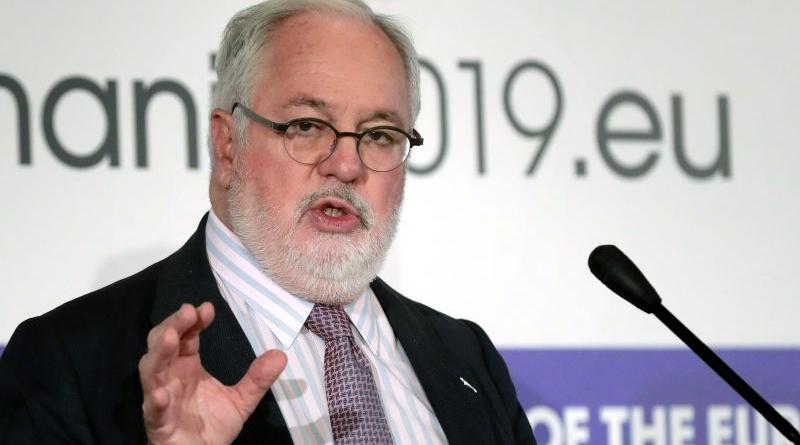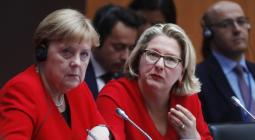National energy and climate plans will not meet targets, EU warns.

The European Commission will warn EU countries later today (18 June) that draft national plans for the coming decade are insufficient to achieve the bloc’s 2030 energy and climate targets, according to documents seen by EURACTIV. “Substantial” gaps have been identified.
Implementing the EU’s new energy and climate laws up to 2030 means taking stock of how member states intend to help meet the bloc’s joint commitments, now that country-specific targets have been ditched.
But the European Commission’s appraisal, set to be published today (18 June) will reveal that national efforts currently come up short.
According to the EU executive, renewable energy deployment could fall short by 1.6 percentage points against a 32% target for 2030. And energy efficiency measures risk leaving a gap of 6.2 percentage points versus a 32.5% benchmark.
On the bright side, the Commission estimates that the National Energy and Climate Plans (NECPs) are indeed enough to achieve an overall greenhouse gas reduction of 40% compared to 1990 levels, the EU’s official target.
However, that target is now largely considered outdated since it was agreed in 2014, before the Paris Agreement was signed. The European Parliament, as well as UN Secretary General Antonio Guterres, have called for that goal to be ratcheted up to 55%, saying that would bring the EU in line with its Paris commitments.
But today’s assessment warns that the member states will come up 2% short in sectors like agriculture, ground transport and buildings, which are not covered by the EU’s carbon trading system. The current trajectory is heading for 28% cuts rather than the agreed 30%.
New laws brokered last year, if fully implemented, mean the EU could achieve around 45% emissions cuts by 2030. But countries are not on track to reach that objective.
EU officials have acknowledged that gaps are “substantial” in places but insist that there is time and scope to make changes. They also called for patience with EU member states, pointing out that this is the first time EU countries have been asked to do this.
Sage advice
As part of its appraisal, the Commission has made a number of recommendations to each country. Member states now have until December to tweak their plans and bring them up to code.
In a memo seen by EURACTIV, the Commission recommends that every country improve their renewables and energy efficiency contributions.
“Some member states are called to increase efforts and better exploit their national potential while others will need to confirm their already ambitious objectives,” it says.
France and Spain emerge as top of the class in an overview table produced by the Commission, which grades countries on factors like their overall progress, investment performance and air quality measures.
“In the face of the climate breakdown, leaving energy savings potentials untapped is gross negligence,” said Roland Joebstl from the European Environmental Bureau (EEB), a green pressure group.
“We have six months to fix the plans and scale-up action on energy efficiency,” he told EURACTIV.
Every country has been given advice on phasing out fossil fuels subsidies, as well as ramping up planning on research, innovation and competitiveness. There are also recommendations on cross-border energy interconnection targets.
An EU official stressed that the stock-take is “more than just about targets”. The Commission has focused on policy suggestions and encouraging national capitals for living up to their end of the deal by submitting their plans in the first place, the official explained.
Draft strategies were submitted to the EU executive in December and January, a deadline imposed by the bloc’s Governance Regulation, which is designed to keep track of energy and climate progress.
Seven countries missed the 31 December 2018 cut-off point but later turned in their work.
Environmental groups have used the last six months to do their own scrutineering of National Energy and Climate Plans. One study by the European Climate Foundation released in May showed that not a single plan was on track to reach net-zero emissions by 2050.
Mirroring the Commission’s analysis, that study also graded France and Spain as the two best-performing NECPs. Nevertheless all the national plans were criticised for failing to “live up to the ambitions set by EU legislators and the Paris Agreement”.
2050 strategy
A long-term EU-wide strategy for 2050 is awaiting approval by the European Council but individual countries also have to develop their own future-leaning plans by January 2020.
In its memo, the Commission said that “more than half of the draft NECPs already include 2050 objectives or visions, albeit with varying degrees of detail”.
Member states like Finland, Ireland and the United Kingdom have in recent weeks unveiled their mid-century strategies, aiming for net-zero emissions by 2050 or even earlier.
On Thursday (20 June), EU leaders could sign off on a long-term climate strategy after it emerged that a significant majority of member states support the European Commission’s proposed carbon neutrality target for 2050.
18 June 2019
![]()





